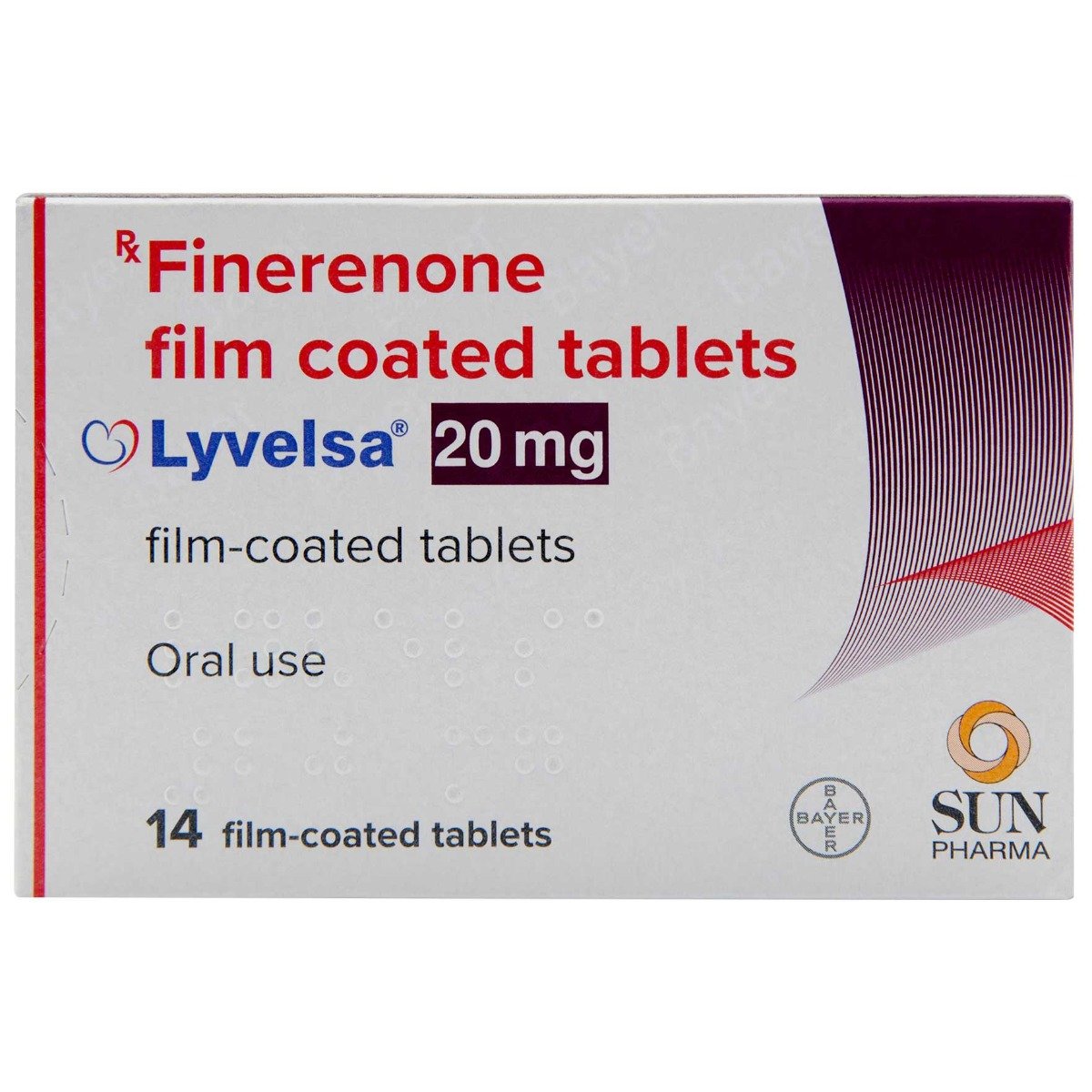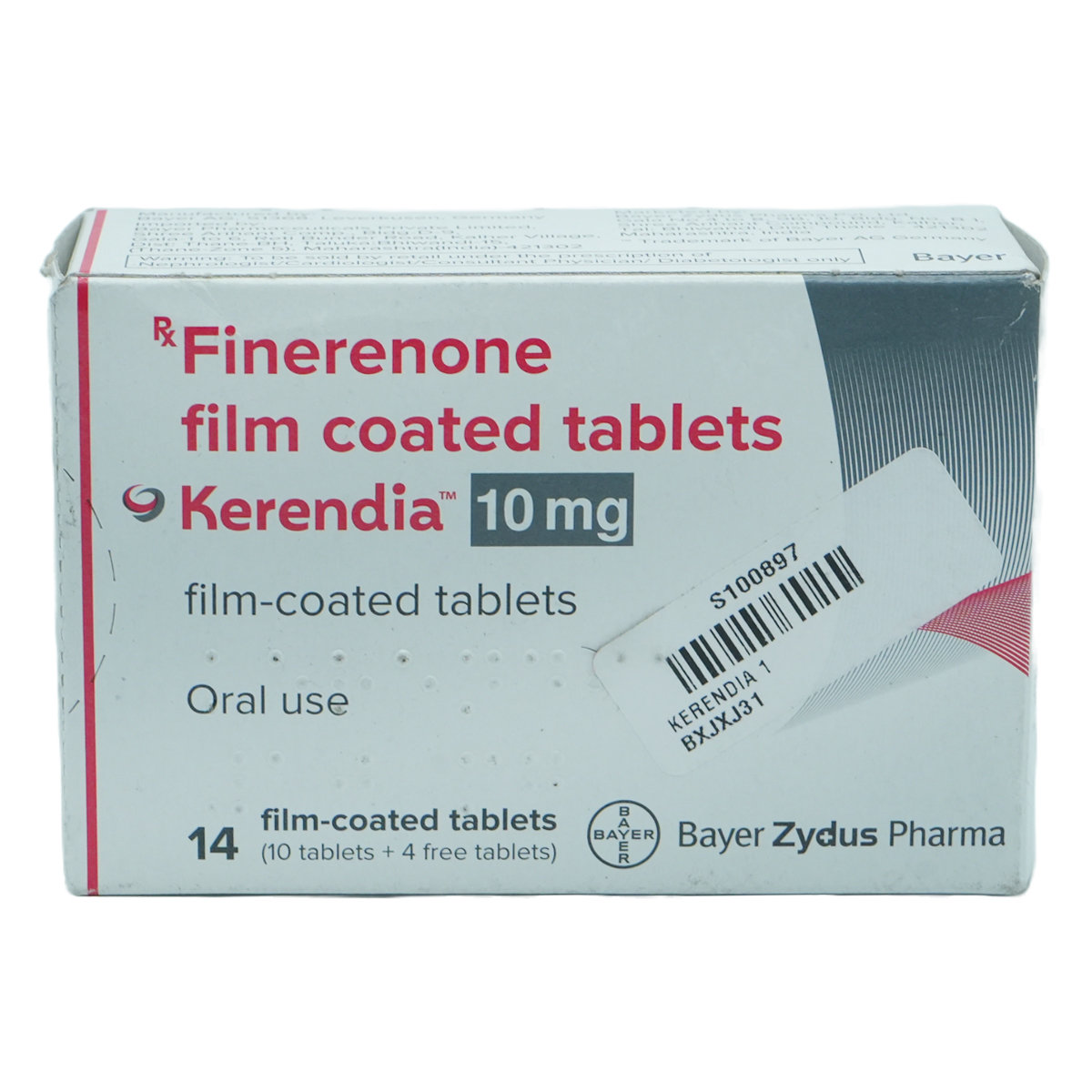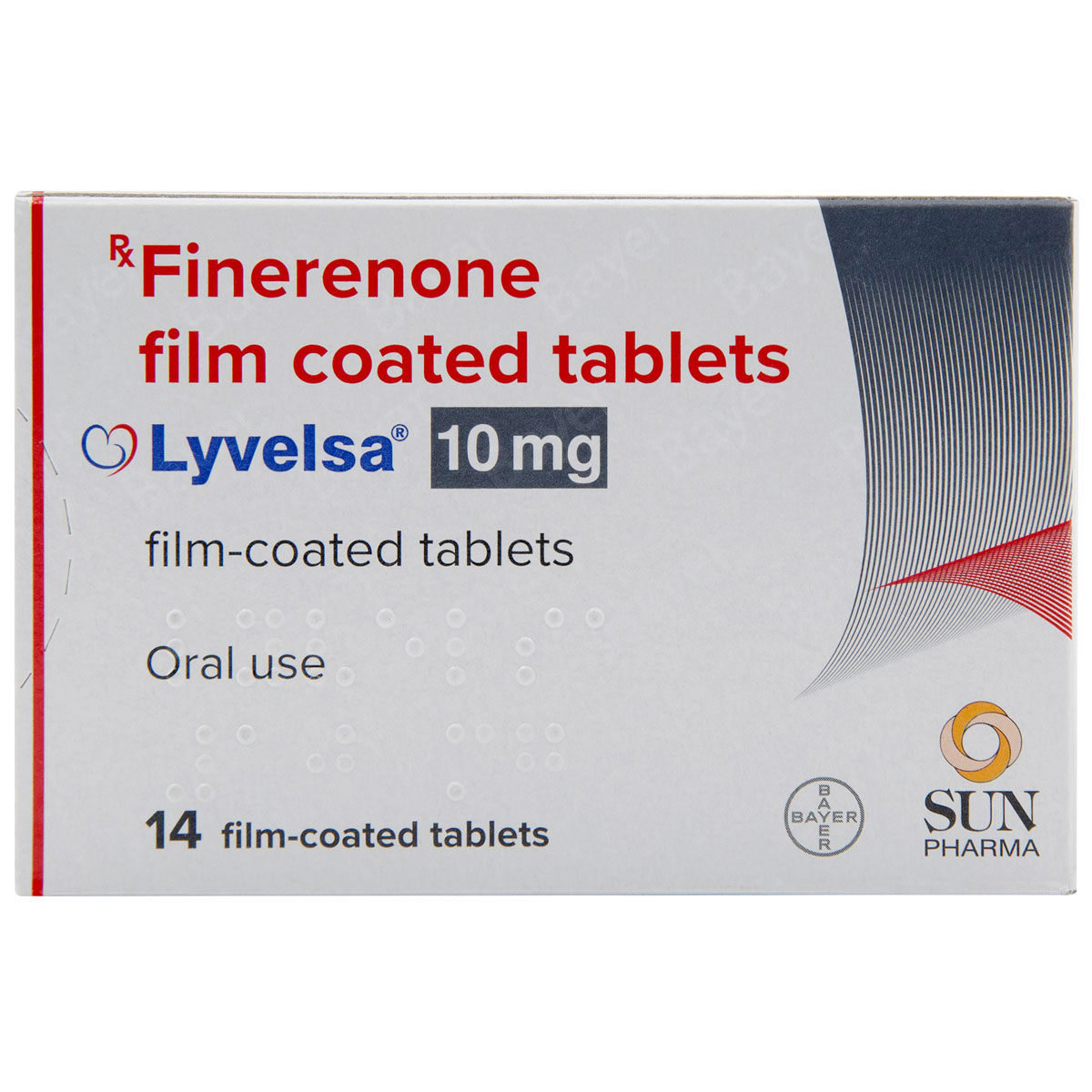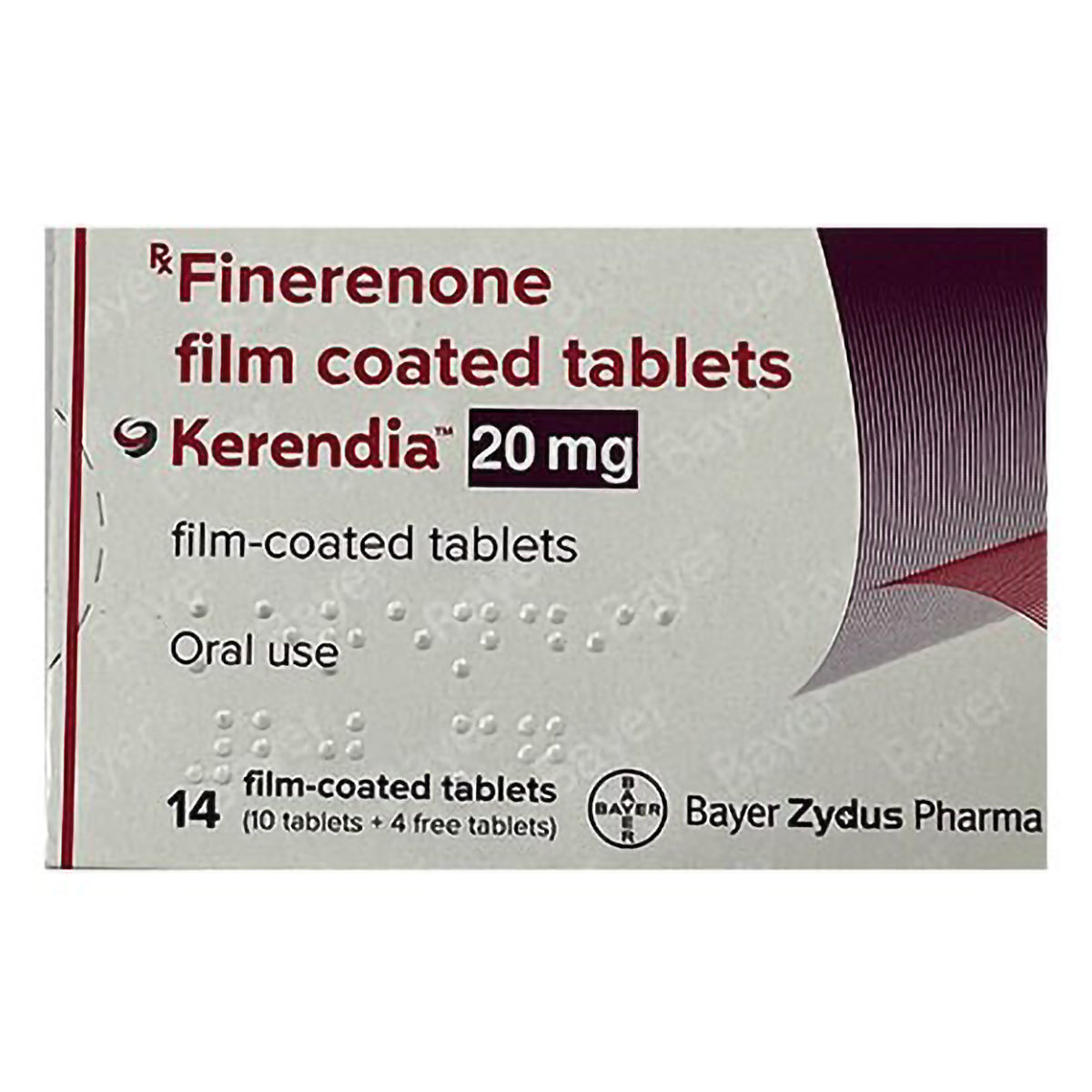Finerenone
About Finerenone
Finerenone is used to treat chronic renal damage caused by type 2 diabetes. Finerenone also lowered the occurrence of new-onset heart failure considerably. Chronic renal disease is defined by a gradual kidney function decline over time. Type 2 diabetes occurs when your body cannot maintain normal blood sugar levels.
Finerenone contains the active substance finerenone. It works by blocking the action of certain hormones (mineralocorticoids) that can damage your kidneys and heart.
Finerenone may cause high potassium levels, weakness, feeling sick (nausea), numbness in the hands and lips, decreased pulse rate, low sodium level, tiredness, headache, confusion, muscle weakness, spasms. Most of these side effects do not necessitate medical attention and will resolve gradually over time. If you are experiencing these side effects regularly, consult your doctor.
If you are allergic to any components in this composition, do not take Finerenone; if in doubt, check with a healthcare expert. You should not use this medication while pregnant unless your doctor says it is absolutely necessary. Inform your doctor if you have hyperkalemia (high potassium level), severe renal illness, liver illness, heart failure, or Addison's disease (when your body does not generate enough of the hormones cortisol and aldosterone).
Uses of Finerenone
Medicinal Benefits
- Finerenone contains the active ingredient finerenone which belongs to a class of drugs known as non-steroidal mineralocorticoid receptor (MR) antagonists.
- It is indicated to reduce the risk of sustained eGFR decline, end-stage kidney disease, cardiovascular death, non-fatal myocardial infarction, and hospitalisation for heart failure in adult patients with chronic kidney disease associated with type 2 diabetes.
- Finerenone also lowered the occurrence of new-onset heart failure considerably.
- This medicine acts by inhibiting the function of specific hormones (mineralocorticoids) that might cause kidney and cardiac damage.
Directions for Use
- Finerenone can be taken with or without food as advised by your doctor.
- It is recommended to take Finerenone once daily; however, follow your doctor's advice regarding the dosage and duration.
- Swallow Finerenone as a whole with water.
- Do not crush, break or chew it.
Storage
Side Effects of Finerenone
- High potassium level (hyperkalaemia)
- Weakness
- Feeling sick (nausea)
- Numbness in the hands and lips
- Muscle cramps
- Decreased pulse rate
- Low sodium level (hyponatraemia)
- Tiredness
- Headache
- Confusion
- Muscle weakness, spasms or cramps
- High uric acid level (hyperuricaemia)
Drug Warnings
- Before taking Finerenone, inform your doctor about your medical history (heart, liver or kidney impairment) and other medications (especially diuretics, anti-bacterial and potassium salts) you are currently taking to rule out any potential negative effects.
- If you are allergic to any components in this composition, do not take Finerenone; if in doubt, check with a healthcare expert.
- You must not take medicines that belong to the group of ‘strong CYP3A4 inhibitors’ while taking Finerenone.
- You should not use this medication while pregnant unless your doctor says it is absolutely necessary.
- You should not breastfeed if you are on this medication; it might harm your child.
- This medicine should not be given to children or teenagers under the age of 18 because it is not known whether it is safe and effective in this age group.
- Do not eat grapefruit or drink grapefruit juice as long as you take Finerenone.
Drug Interactions
Drug-drug interactions: Finerenone may interact with antifungal medications (e.g. itraconazole or ketoconazole), HIV medications (e.g. ritonavir, nelfinavir, or cobicistat) and anti-depression medicines (e.g. nefazodone).
Drug-food interactions: Reduce the consumption of potassium and phosphate in your diet. Do not consume grapefruit or grapefruit juice while taking Finerenone.
Drug-disease interactions: Finerenone should be used with caution in patients with a high potassium level in the blood, severe renal function loss or failure, liver difficulties, heart failure, or Addison's disease (when your body does not generate enough of the hormones 'cortisol' and 'aldosterone').
Drug-Drug Interactions Checker List:
Safety Advice

Alcohol
consult your doctorIt is not known if alcohol interacts with Finerenone. Please consult the doctor.

Pregnancy
consult your doctorYou should not use this medication while pregnant unless your doctor says it is absolutely necessary.

Breast Feeding
unsafeYou should not breastfeed if you are on this medication. It might harm your child.

Driving
cautionFinerenone has no effect on your ability to drive or use machines. But drive only if you are alert, as the Finerenone may cause weakness or tiredness in some people.

Liver
cautionCaution should be exercised while using Finerenone in patients with liver impairment. If you have a pre-existing or a history of liver disease, inform your doctor before taking the Finerenone. Your doctor will weigh the benefits and potential risks before prescribing Finerenone.

Kidney
safe if prescribedFinerenone can be taken safely if prescribed.

Children
unsafeThis medicine should not be given to children or teenagers under the age of 18 because it is not known whether it is safe and effective in this age group.
Habit Forming
Diet & Lifestyle Advise
- A healthy, balanced diet lowers your risk of kidney disease. Keep your blood pressure and cholesterol at a healthy level.
- A well-balanced diet should include plenty of fruits and vegetables.
- Include starchy foods such as potatoes, wholegrain bread, rice, or pasta in your main meal.
- For a protein source, include beans or pulses, fish, eggs, or meat in your daily diet.
- Limit intake of saturated fat, salt, and sugar.
- Limit the amount of potassium or phosphate in your diet.
- Quit smoking. Avoid or limit the consumption of alcohol.
Special Advise
- Do not skip any laboratory appointments, as your doctor will need to regularly check your liver and kidneys and blood and urine samples.
Patients Concern
Disease/Condition Glossary
Chronic kidney disease: Chronic kidney disease, also known as chronic kidney failure, is a long-term kidney condition that results in renal failure. Kidneys remove waste and extra fluid from the blood. Renal disease is characterised by a steady decline of kidney function over time. As a result, waste can accumulate to dangerously high levels in the blood, potentially making you sick. Loss of appetite, nausea, vomiting, sleep problems, and swelling of the feet and ankles are the symptoms of renal failure. Treatment focuses mostly on stopping the progression of kidney disease by addressing the underlying cause.
FAQs
Finerenone is used to treat patients with chronic renal damage caused by type 2 diabetes. It also lowered the occurrence of new-onset heart failure considerably.
Finerenone contains the active substance finerenone. It works by blocking the action of certain hormones (mineralocorticoids) that can damage your kidneys and heart.
To treat your condition effectually, continue taking Finerenone for as long as your doctor has prescribed. Your doctor may make this decision after checking your blood. Please do not stop taking Finerenone without consulting your doctor.
CKD is typically caused by illnesses such as high blood pressure, diabetes, high cholesterol, kidney infections, renal inflammation, recurring kidney stones, an enlarged prostate, and long-term, regular use of certain medications such as lithium and nonsteroidal anti-inflammatory drugs (NSAIDs).
Chronic kidney disease (CKD) cannot always be avoided, but it can be reduced by controlling underlying illnesses such as diabetes or high blood pressure.
Taking too many painkillers (nonsteroidal anti-inflammatory medicines) or taking them longer than recommended can lead to chronic renal disease.
Tobacco use increases your risk of cardiovascular disease, such as heart attacks or strokes, which has been related to an elevated risk of chronic kidney disease (CKD).
Blood and urine tests can be used to detect chronic kidney disease (CKD). Other tests may be used to determine the extent of kidney injury. These may include an ultrasound, MRI, or CT scan, as well as a kidney biopsy.
When taking Finerenone, it is important to avoid certain foods and substances that can interact with the medication, such as Grapefruit and Grapefruit Juice, High-Potassium Foods, and Alcohol. Always consult with your healthcare provider for personalized dietary advice and recommendations while taking Finerenone.
Both medications have shown effectiveness in managing CKD and reducing the risk of complications. The choice between them may depend on individual patient factors, such as kidney function, blood pressure levels, and specific health conditions. Ultimately, the decision between Finerenone and Farxiga should be made in consultation with your healthcare provider, who can consider your medical history and needs.
Yes, Finerenone has been shown to improve kidney function in patients with chronic kidney disease (CKD) associated with type 2 diabetes. It works by blocking the effects of aldosterone, a hormone that can cause kidney inflammation and scarring. Clinical studies have demonstrated that Finerenone can reduce the risk of kidney function decline, kidney failure, and cardiovascular complications.
Breastfeeding women should avoid taking Finerenone. It is recommended to avoid breastfeeding during treatment with Finerenone, as the medication may pass into breast milk and potentially harm the nursing infant.
Yes, Finerenone has been shown to reduce the risk of heart failure events in high-risk patients. Clinical studies have demonstrated that Finerenone can reduce the risk of cardiovascular death, non-fatal heart attacks, and hospitalization for heart failure in adults with chronic kidney disease (CKD) associated with type 2 diabetes. This makes it an effective option for managing kidney and heart health in high-risk patients.
Yes, Finerenone can increase potassium levels in the body. This is a known side effect of the medication, and it is essential to monitor potassium levels regularly while taking Finerenone. Your healthcare provider may adjust your dose or recommend additional monitoring to manage this risk.
Finerenone is typically taken once daily. Following your healthcare provider's instructions regarding the dosage and frequency is essential. Your doctor may adjust the dose based on your kidney function and potassium levels.
Yes, Finerenone can result in low blood pressure (hypotension), a known side effect of the medication. In clinical studies, low blood pressure occurred in a small percentage of patients taking Finerenone. If you experience symptoms such as dizziness, lightheadedness, or fainting while taking this medication, it's important to consult your healthcare provider.





